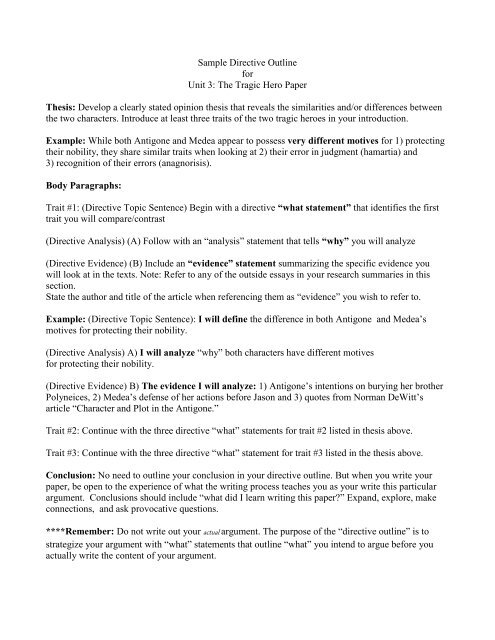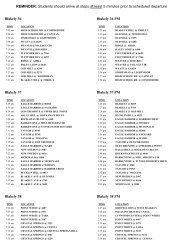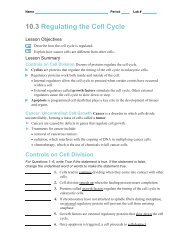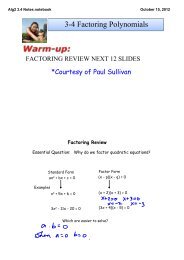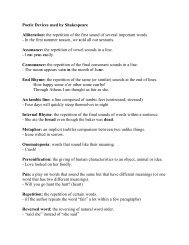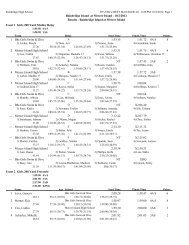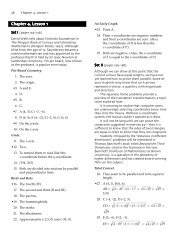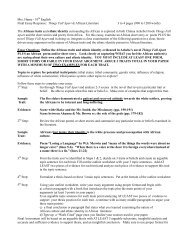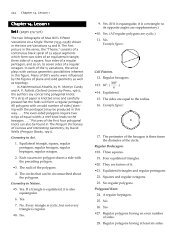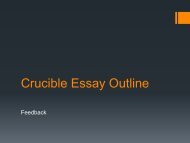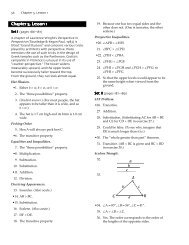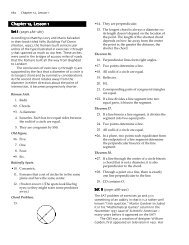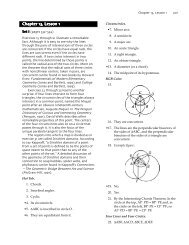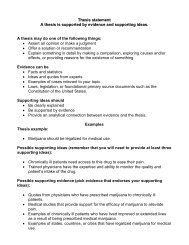Sample Directive Outline for Unit 3: The Tragic Hero Paper Thesis ...
Sample Directive Outline for Unit 3: The Tragic Hero Paper Thesis ...
Sample Directive Outline for Unit 3: The Tragic Hero Paper Thesis ...
Create successful ePaper yourself
Turn your PDF publications into a flip-book with our unique Google optimized e-Paper software.
<strong>Sample</strong> <strong>Directive</strong> <strong>Outline</strong><strong>for</strong><strong>Unit</strong> 3: <strong>The</strong> <strong>Tragic</strong> <strong>Hero</strong> <strong>Paper</strong><strong>The</strong>sis: Develop a clearly stated opinion thesis that reveals the similarities and/or differences betweenthe two characters. Introduce at least three traits of the two tragic heroes in your introduction.Example: While both Antigone and Medea appear to possess very different motives <strong>for</strong> 1) protectingtheir nobility, they share similar traits when looking at 2) their error in judgment (hamartia) and3) recognition of their errors (anagnorisis).Body Paragraphs:Trait #1: (<strong>Directive</strong> Topic Sentence) Begin with a directive “what statement” that identifies the firsttrait you will compare/contrast(<strong>Directive</strong> Analysis) (A) Follow with an “analysis” statement that tells “why” you will analyze(<strong>Directive</strong> Evidence) (B) Include an “evidence” statement summarizing the specific evidence youwill look at in the texts. Note: Refer to any of the outside essays in your research summaries in thissection.State the author and title of the article when referencing them as “evidence” you wish to refer to.Example: (<strong>Directive</strong> Topic Sentence): I will define the difference in both Antigone and Medea’smotives <strong>for</strong> protecting their nobility.(<strong>Directive</strong> Analysis) A) I will analyze “why” both characters have different motives<strong>for</strong> protecting their nobility.(<strong>Directive</strong> Evidence) B) <strong>The</strong> evidence I will analyze: 1) Antigone’s intentions on burying her brotherPolyneices, 2) Medea’s defense of her actions be<strong>for</strong>e Jason and 3) quotes from Norman DeWitt’sarticle “Character and Plot in the Antigone.”Trait #2: Continue with the three directive “what” statements <strong>for</strong> trait #2 listed in thesis above.Trait #3: Continue with the three directive “what” statement <strong>for</strong> trait #3 listed in the thesis above.Conclusion: No need to outline your conclusion in your directive outline. But when you write yourpaper, be open to the experience of what the writing process teaches you as your write this particularargument. Conclusions should include “what did I learn writing this paper?” Expand, explore, makeconnections, and ask provocative questions.****Remember: Do not write out your actual argument. <strong>The</strong> purpose of the “directive outline” is tostrategize your argument with “what” statements that outline “what” you intend to argue be<strong>for</strong>e youactually write the content of your argument.
<strong>Directive</strong> <strong>Outline</strong>From <strong>Directive</strong> <strong>Outline</strong> to Final <strong>Paper</strong>Topic Sentence: I will define the difference in both Antigone and Medea's motives <strong>for</strong>protecting their nobility.Analysis: I will analyze “why” Antigone motives <strong>for</strong> protecting her status as queen were noblewhile Medea's motives were driven by jealous rage.Evidence: <strong>The</strong> evidence I will use: 1) Antigone's intentions <strong>for</strong> burying her brother,2) Medea's defense of her sacrifices made <strong>for</strong> Jason and 3) quotes from Norman DeWitt from“Character and Plot in the Antigone.”Final <strong>Paper</strong> <strong>Sample</strong> ParagraphAntigone and Medea demonstrate very different motives <strong>for</strong> protecting their nobility andstatus. Antigone appears obedient and respectful of divine law and the god’s wishes to sustainher reputation while Medea is driven by jealous rage to defend her status in Corinth.Antigone proves she is well-intentioned when she commits to burying her brotherPolynecies. Even though she has to betray Creon’s state law, she honors a higher law that shefeels represents the needs of all Greek citizens and not just <strong>The</strong>ban’s. While this is a verypainful decision <strong>for</strong> her, she demonstrates a faithfulness to both her family, her country and thegods.Medea appears extremely jealous and protective at the beginning of the play and isfocused on protecting her role as a wife and mother in Corinth. She restates how much she hassacrificed <strong>for</strong> Jason, imposing guilt and retribution on her husband and Creon. She doesn'tstop there but proceeds to plot a way to bring retribution on not only Jason but his new wifewho would replace her status in Corinth. She does not think rationally nor question therepercussions of her plot against both Jason, his new wife or her own children.(Synthesis) While Jocasta proves herself to be faithful to her noble status as queen of <strong>The</strong>besand undeserving of losing her nobility, Lady Macbeth proves herself to be corrupted by powerand thus deserving of losing her nobility. Jocasta demands our sympathy while Lady Macbethonly gains pity from the audience <strong>for</strong> her short-sightedness.
From Topic Statements to Final <strong>The</strong>sis<strong>The</strong> HookFirst, create a “hook” that both introduces the main topic of this paper and expresses youropinion about this main topic: namely, the role of the tragic hero.<strong>Sample</strong> Hook: “<strong>The</strong> role of the tragic hero in literature demonstrates both the strengthsand weaknesses of the ever day person, challenged by both their own feelings of revengeand good will.Final <strong>The</strong>sisBased on your three topic sentences, determine the final wording of your thesis:Topic Sentence #1: Antigone and Medea demonstrate very different motives <strong>for</strong> protectingtheir nobility and status.Topic Sentence #2: Antigone and Medea have similar errors in judgment. Both defy authorityto defend their course of action abandoning all sense of reason and compromise.Topic Sentence #3: Antigone and Medea have similar realizations of their errors. Neitherwoman admits to wrong-doing or feels regret <strong>for</strong> their actions. Both feel justified at the end.Final <strong>The</strong>sis: While Antigone and Medea have 1) different motives <strong>for</strong> protecting theirnobility, they share similar traits when looking at their 2) errors in judgment and 3)realization of their errors.


